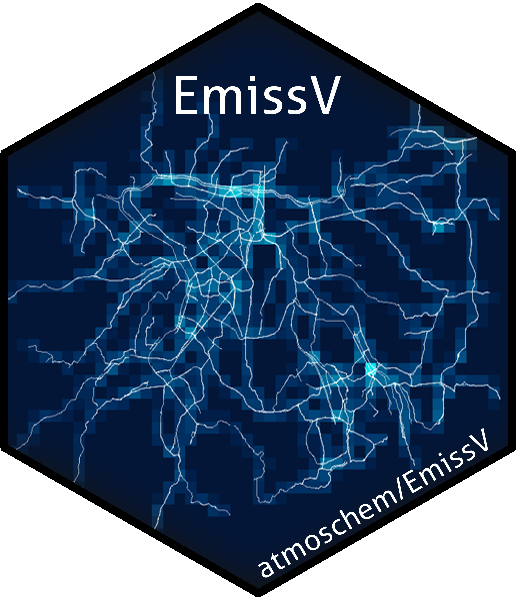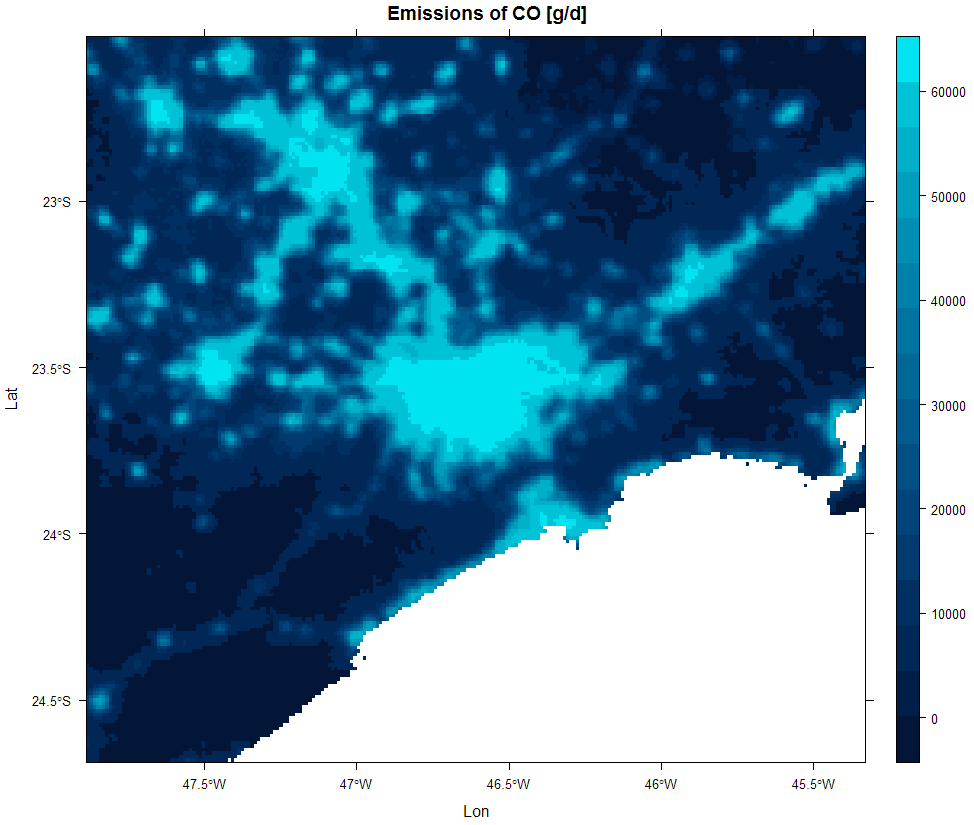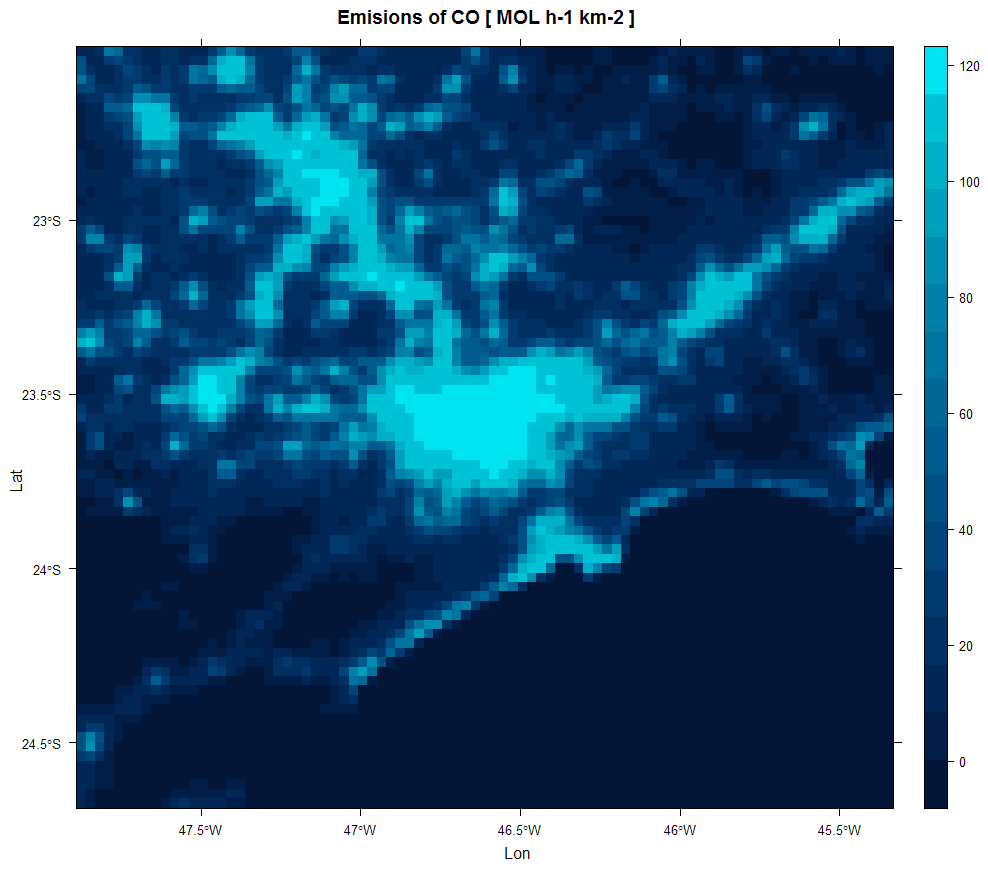This package provides some methods to create emissions (with a focus on vehicular emissions) for use in numeric air quality models such as WRF-Chem.
EmissV import functions from ncdf4 for reading model information, raster and sf to process grinded/geographic information and units. These packages need some aditional libraries:
The following steps are required for installation on Ubuntu:
sudo add-apt-repository ppa:ubuntugis/ubuntugis-unstable --yes
sudo apt-get --yes --force-yes update -qq
# netcdf dependencies:
sudo apt-get install --yes libnetcdf-dev netcdf-bin
# units/udunits2 dependency:
sudo apt-get install --yes libudunits2-dev
# sf dependencies (without libudunits2-dev):
sudo apt-get install --yes libgdal-dev libgeos-dev libproj-devThe following steps are required for installation on Fedora:
sudo dnf update
# netcdf dependencies:
sudo yum install netcdf-devel
# units/udunits2 dependency:
sudo yum install udunits2-devel
# sf dependencies (without libudunits2-dev):
sudo yum install gdal-devel proj-devel proj-epsg proj-nad geos-develNo additional steps for windows installation.
Detailed instructions can be found at netcdf, libudunits2-dev and sf developers page.
To install the CRAN version (0.664.7):
install.packages("EmissV")To install the development version (0.664.8):
# install.packages("devtools")
devtools::install_github("atmoschem/EmissV")In EmissV the vehicular emissions are estimated by a top-down approach, i.e. the emissions are calculated using the statistical description of the fleet at avaliable level (National, Estadual, City, etc).The following steps show an example workflow for calculating vehicular emissions, these emissions are initially temporally and spatially disaggregated, and then distributed spatially and temporally.
I. Total: emission of pollutants is estimated from the fleet, use and emission factors and for the interest area (cities, states, countries, etc).
library(EmissV)
fleet <- vehicles(example = T)
# using a example of vehicles (DETRAN 2016 data and SP vahicle distribution):
# Category Type Fuel Use SP ...
# Light Duty Vehicles Gasohol LDV_E25 LDV E25 41 km/d 11624342 ...
# Light Duty Vehicles Ethanol LDV_E100 LDV E100 41 km/d 874627 ...
# Light Duty Vehicles Flex LDV_F LDV FLEX 41 km/d 9845022 ...
# Diesel Trucks TRUCKS_B5 TRUCKS B5 110 km/d 710634 ...
# Diesel Urban Busses CBUS_B5 BUS B5 165 km/d 792630 ...
# Diesel Intercity Busses MBUS_B5 BUS B5 165 km/d 21865 ...
# Gasohol Motorcycles MOTO_E25 MOTO E25 140 km/d 3227921 ...
# Flex Motorcycles MOTO_F MOTO FLEX 140 km/d 235056 ...
fleet <- fleet[,c(-6,-8,-9)] # dropping RJ, PR and SC
EF <- emissionFactor(example = T)
# using a example emission factor (values calculated from CETESB 2015):
# CO PM
# Light duty Vehicles Gasohol 1.75 g/km 0.0013 g/km
# Light Duty Vehicles Ethanol 10.04 g/km 0.0000 g/km
# Light Duty Vehicles Flex 0.39 g/km 0.0010 g/km
# Diesel trucks 0.45 g/km 0.0612 g/km
# Diesel urban busses 0.77 g/km 0.1052 g/km
# Diesel intercity busses 1.48 g/km 0.1693 g/km
# Gasohol motorcycles 1.61 g/km 0.0000 g/km
# Flex motorcycles 0.75 g/km 0.0000 g/km
TOTAL <- totalEmission(fleet,EF,pol = c("CO"),verbose = T)
# Total of CO : 1128297.0993334 t year-1II. Spatial distribution: The package has functions to read information from tables, georeferenced images (tiff), shapefiles (sh), OpenStreet maps (osm), global inventories in NetCDF format (nc) to calculate point, line and area sources.
raster <- raster::raster(paste(system.file("extdata", package = "EmissV"),
"/dmsp.tiff",sep=""))
grid <- gridInfo(paste(system.file("extdata", package = "EmissV"),
"/wrfinput_d02",sep=""))
# Grid information from: .../EmissV/extdata/wrfinput_d02
shape <- raster::shapefile(paste(system.file("extdata", package = "EmissV"),
"/BR.shp",sep=""),verbose = F)[12,1]
Minas_Gerais <- areaSource(shape,raster,grid,name = "Minas Gerais")
# processing Minas Gerais area ...
# fraction of Minas Gerais area inside the domain = 0.0145921494236101
shape <- raster::shapefile(paste(system.file("extdata", package = "EmissV"),
"/BR.shp",sep=""),verbose = F)[22,1]
Sao_Paulo <- areaSource(shape,raster,grid,name = "Sao Paulo")
# processing Sao Paulo area ...
# fraction of Sao Paulo area inside the domain = 0.474658563750987
sp::spplot(raster::merge(drop_units(TOTAL$CO[[1]]) * Sao_Paulo,
drop_units(TOTAL$CO[[2]]) * Minas_Gerais),
scales = list(draw=TRUE),ylab="Lat",xlab="Lon",
main=list(label="Emissions of CO [g/d]"),
col.regions = c("#031638","#001E48","#002756","#003062",
"#003A6E","#004579","#005084","#005C8E",
"#006897","#0074A1","#0081AA","#008FB3",
"#009EBD","#00AFC8","#00C2D6","#00E3F0"))III. Emission calculation: calculate the final emission from all different sources and converts to model units and resolution.
CO_emissions <- emission(TOTAL,"CO",list(SP = Sao_Paulo, MG = Minas_Gerais),grid,mm=28, plot = T)
# calculating emissions for CO using molar mass = 28 ...IV. Temporal distribution: the package has a set of hourly profiles that represent the mean activity for each day of the week calculated from traffic counts of toll stations located in São Paulo city.
data(perfil)
names(perfil)The package has additional functions for read netcdf data, create line and point sources (with plume rise) and to estimate the total emissions of of volatile organic compounds from exhaust (through the exhaust pipe), liquid (carter and evaporative) and vapor (fuel transfer operations).
Functions:
- read: read global inventories in netcdf format
- vehicles: tool to set-up vehicle data.table
- emissionFactor: tool to set-up emission factors data.table
- gridInfo: read grid information from a NetCDF file
- pointSource: emissions from point sources
- plumeRise: calculate plume rise
- rasterSource: distribution of emissions by a georeferenced image
- lineSource: distribution of emissions by line vectors
- streetDist: distribution by OpenStreetnMap street (in progress)
- areaSource: distribution of emissions by region
- totalEmission: total emissions
- totalVOC: total VOCs emission (this function will be discontinued in the next versions)
- emission: Emissions to atmospheric models
Sample datasets:
- Perfil: vehicle counting profile for vehicular activity
- Sample of an image of persistent lights of the Defense Meteorological Satellite Program (DMSP)
- CETESB 2015 emission factors as
emissionFactor(example=T) - DETRAN 2016 data and SP vahicle distribution as
vehicles(example=T) - Shapefiles for Brazil states
Bug reports, suggestions, and code contributions are all welcome. Please see CONTRIBUTING.md for details. Note that this project adopt the Contributor Code of Conduct and by participating in this project you agree to abide by its terms.
EmissV is a tool developed during Daniel Schuch's post-doctorate at the at the Department of Atmospheric Sciences, University of São Paulo (IAG-USP) supervised by professor Edmilson Dias de Freitas.
EmissV is published under the terms of the MIT License. Copyright (c) 2018 Daniel Schuch.




